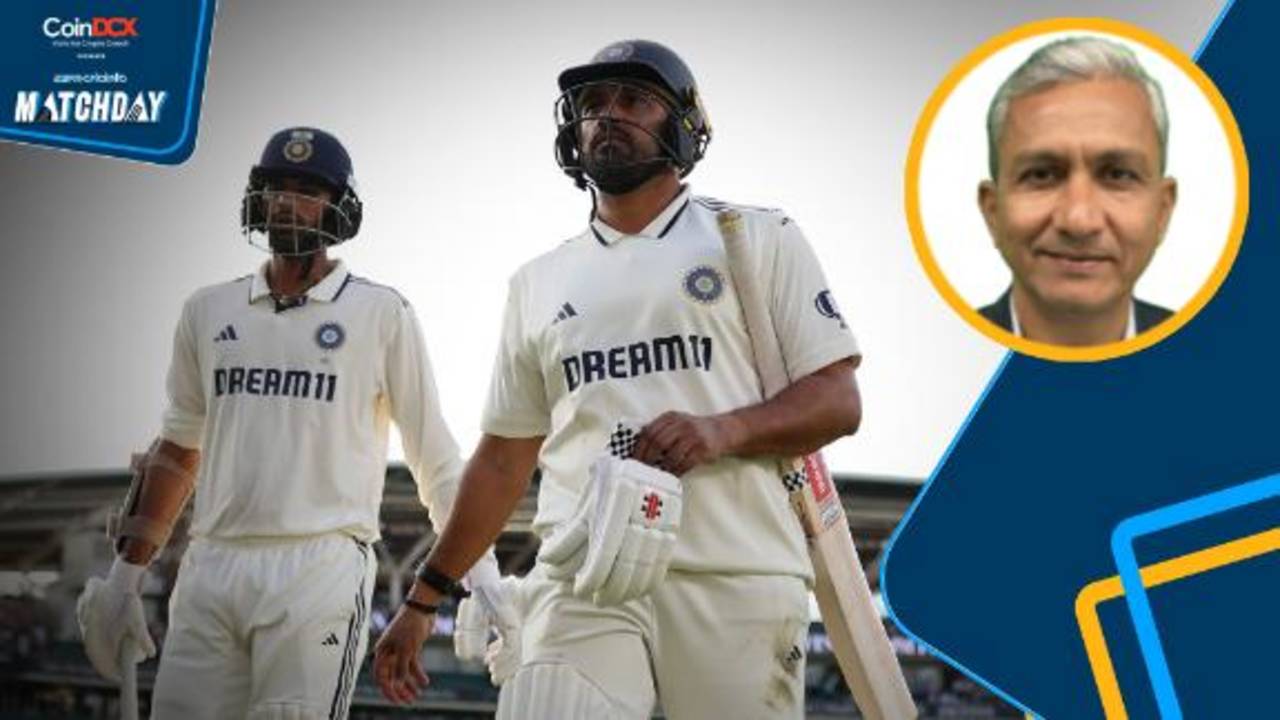India get caught up in the Tongue paradox
Wayward for most parts, Tongue conjured two beauties in a spell that encapsulates his England career
Matt Roller
Jul 31, 2025, 8:33 PM
Josh Tongue could only laugh. He was Pollockesque at The Oval but more Jackson than Shaun, bowling like a man flinging paint at a blank canvas only to discover that he had painted a masterpiece. It is hard to recall a more scattergun performance from an England seamer, but twice in 12 balls, Tongue shocked everyone - not least himself - by hitting the bullseye.
His figures - 2 for 47 in 13 overs - entirely masked the story. Left out for the third and fourth Tests, he was utterly wild in his first over of this one, pushing one ball so far outside off stump that it was called wide and spraying two so far down the leg side that they cost five each. He struggled with the landing area, but needed more than sawdust to solve this problem.
It was briefly reminiscent of the spell that George Scrimshaw, Tongue's old Worcestershire team-mate, bowled on England debut against Ireland two years ago, in which his first two overs cost 35 runs and featured six front-foot no-balls. If Tongue kept his foot behind the line then his lack of control was just as alarming, to the point of evoking sympathy.
A change of ends made no impact. After five overs from the Vauxhall End before lunch, and the subsequent rain delay, Tongue charged in from the Pavilion End and sprayed his first ball down the leg side. Then, from nowhere, came his first unplayable ball: angling towards B Sai Sudharsan's off stump from around the wicket, then nipping away to take the outside edge.
Yet, the wicket appeared to have no effect on what followed. His next over to Karun Nair was wayward, and his first two balls to Ravindra Jadeja went for eight runs: the first was flung down the leg side past the blameless Jamie Smith, the second - short and wide outside off, in a seismic overcorrection - was uppercut over the slip cordon for four.
Then came the second jaffa, a surprise straight ball after two sprayed either side of the wicket. It was the same line as the ball that dismissed Sai Sudharsan, but around two metres shorter, and took the shoulder of the bat. Jadeja could hardly believe his luck as Smith took another simple catch, and Tongue grinned then burst out laughing as he celebrated with Zak Crawley.

Josh Tongue bowled to the left, he bowled to the right, but in between also picked up two wickets•Getty Images
It was an extreme encapsulation of Tongue's England career. A compilation of his 25 Test wickets could give you the impression that he was the world's best bowler: a swinging yorker to clean up David Warner and bouncing Steven Smith out two summers ago, then knocking back KL Rahul's middle stump and ripping Jadeja's glove off in Birmingham.
There has been plenty of bad mixed in with the good. At this early stage in his career, he is the only England bowler in history with more than 25 Test wickets coupled with an economy rate above four. But therein lies the Tongue Paradox: his bad balls can make his good ones even better, such is the element of surprise.
"It actually makes it very challenging when someone bowls like Josh did today," Ryan ten Doeschate, India's assistant coach, said. "He's a very good bowler and when you don't know what's coming down as a batter, and he's bowled a couple of absolute jaffas in there, and got two big wickets, it does make it tough."

Josh Tongue had an opening day of two halves•Getty Images
There were shades of Steve Harmison, with two balls of the version seen in the Caribbean in early 2004 but several more that evoked the start of the 2006-07 Ashes. Stuart Broad, Tongue's two-time England team-mate, suggested that his issues were the result of a technical issue that had developed during his time out of the side.
"When you've played the first two Test matches and come out of the side, you might lose your stride pattern, lose your rhythm," Broad said on Sky Sports. "His great positive is he takes wickets and gets good players out… but he bowled some deliveries today that showed there's some technical things going on that he needs to be able to fix during a Test match."
Tongue's efforts were the logical extreme of an England selection policy that sees players picked for what they can do at their best, without worrying about what they are like at their worst. It is an unapologetically optimistic strategy, one that recognises Tongue not as a great bowler, but as a bowler of great balls.
It is a ploy that can produce extreme results, but one that recognises a fundamental truth of Test cricket. For all its demands of mental and physical resilience, it is ultimately about moments: creating at least 20 wicket-taking chances is a prerequisite for winning, no matter what comes in between them.
Matt Roller is senior correspondent at ESPNcricinfo. @mroller98
